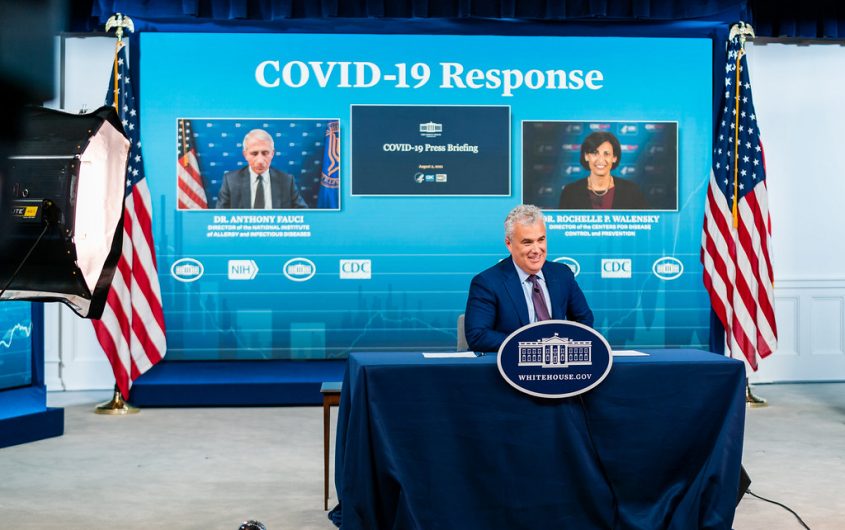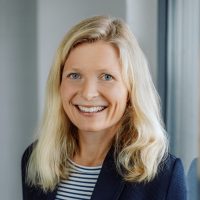
The White House via Flickr
Experts all around us?

Kathrin Loer
University of Applied Sciences Osnabrück
Kathrin Loer is a Professor of Political Studies at University of Applied Sciences Osnabrück in Germany. Her research focuses on consumer science and consumer policy, public health, energy policy, behavioral policy, policy research, advocacy/lobbying, and civil society organizations. She is co-spokesperson of the Advisory Board for Consumer Research of the Federal Ministry for the Environment, Nature Conservation, Nuclear Safety, and Consumer Protection. She is an expert on policy instruments in health and consumer policy as well as behavioral public policy. Her research also focuses on expert involvement and the role of scientific evidence in policy making. She is co-editor of the book Behavioral Policies for Health Promotion and Disease Prevention (Palgrave Pivot, 2019) and has published several articles in academic outlets such as the Journal of Comparative Policy Analysis, Public Health and Policy & Politics.
Kathrin Loer was an NRW Fellow at AICGS from October until December 2019.
Scientific advisors in health systems and their effect on politics
In 2007, the German novelist Juli Zeh published a play in which people live in a health dictatorship. Her dystopian story sheds light on a society and political system in which every single rule is aimed at optimizing people’s health. In such a system, evidence is needed to design interventions and formulate laws that have a tremendous impact on people’s life. Even though this is only a fiction, people in Germany started to argue during the COVID-19 pandemic that the influence of health experts and the orientation toward the goal of prevention is too far-reaching and restrict their freedom too much. In essence, it resembles a “dictatorship.” In this vein, especially the influence of people sweepingly described as “health experts” was partly presented as too extensive. There were even situations where this resistance turned into aggression and threats against professionals and experts involved in political decisions. For example, in 2021 and 2022, the vaccination campaign in Germany seemed to provoke more and more political resistance and anti-science skepticism. This led to more offensive demonstrations and political attacks in which criticism of expert involvement and evidence-based policymaking was a central issue.
Against this background and despite the (sometimes) overheated debate on “expertocracy” and the assumed excessive influence of scientists,[i] we observed a different reality. Generally, Germany is characterized by a decentralized scientific advisory system and independent research institutions within a federal political system. In addition, a closer look depicts a differentiated system with three dimensions of scientific expertise and advice in times of COVID-19 and its influence on the German health system. In order to dispute the argument that the rise of expertise and its prominent role in times of a pandemic led to a weakening of democracy to a critical debate, it is necessary to distinguish the three dimensions. (1) When the COVID-19 pandemic hit Germany in spring 2020, the German government started to cooperate with some distinguished health experts, especially epidemiologists and virologists, who advised policymakers in particular on intervention measures. Yet, these policymakers did not blindly follow the experts’ suggestions. Rather, decision-makers selectively underpinned their harsh interventions by referring to the advice of these experts. In the end, political decisions were the result of bargaining processes and/or ad-hoc balancing of different interests. (2) Since the outbreak of COVID-19 in Germany, everybody is probably familiar with the Robert-Koch-Institute (RKI), which functions as the central scientific institution of the German government for preventive medicine and the protection of public health. The RKI has a long history of research and advising policymakers in many areas of public health. The RKI’s activities of course intensified in connection with COVID-19. However, its influence was and is an essential and institutionalized part of the German health system anyway. The change rather was one of perception, as it became more visible during the pandemic. (3) Typically, many people in Germany have a close relationship to their general practitioner or family doctor (Hausarzt). These local experts, who are also situated in close physical proximity to people, support their patients in all health matters and care for them. Ideally, they also guide them when a specialist opinion is needed and fulfill many other health-related tasks. In a later phase of the German vaccination campaign, general practitioners became involved and started to vaccinate many people.
Analytically, it helps to distinguish these three dimensions: First, ad-hoc and COVID-specific advisory systems (non-institutionalized), second, institutionalized and permanent scientific expertise on behalf of the German government, and third, individual relationship and advisory systems regarding patients or citizens mainly based on the infrastructure of general practitioners and family doctors. At first glance, these three dimensions may be confused by the general use of the term “experts.” Even though all the professionals and experts mentioned above care about people’s health, they do so at different levels. It is important to classify how differently this care is assessed, valued, and accepted by people.
There was a lack in transparency when it came to policymaking processes in pandemics, and research hints to the urgent need for transparent and comprehensible science communication.
The link between intervening policies and the advice of experts who became public actors seems to have provoked opposition and mistrust. Debates about the “right” or appropriate steps to prevent or contain the pandemic were not only conducted in public and dominated the public media but were also limited to the interaction between a few outstanding and (at the time) prominent experts and leading politicians such as the Federal Chancellor (Angela Merkel, CDU), the Minister of Health (Jens Spahn, CDU), and the heads of the Länder. Since the impact of the interventions in public, economic, and private life was far-reaching, this impact was a starting point for general debate and individual complaints. If the interventions were appraised to be suitable and appropriate, then this could reflect on the experts. They were also quoted to justify and underpin certain policies. If the interventions were perceived as a threat to freedom and liberal lifestyles, then the experts were sometimes viewed disparagingly. Such assessments could lead to mistrust in government capacity and ultimately of democratic structures. Moreover, they could reinforce doubts and mistrust of scientific expertise. As a consequence, one could ask what the alternative would have been with regard to the coordination of scientific expertise and political interventions. First studies show that there was probably a lack of systematically integrating experts in a pluralistic way: expert councils could have taken on different functions in policy advice and would have been best represented by a disciplinary and social diversity. Furthermore, there was a lack in transparency when it came to policymaking processes in pandemics,[ii] and research hints to the urgent need for transparent and comprehensible science communication.[iii]
In the case of the RKI, a mixed picture emerges. Its positioning as an institutionalized actor may have initially made it easier to convey its character as a respected and unquestioned authority. Before the COVID-19 outbreak, the RKI did not receive much attention. But since the head of the Robert Koch Institute Lothar Wieler publicly and regularly explained the next steps and political decisions alongside Minister Jens Spahn, Wieler has become a central figure. Especially when the RKI’s position differed from statements of other scientific experts in the media, the public was able to question his role. Research from Hodges et al shows that “the legitimating impact of science on political decisions was particularly large in the early phases of high turbulence and problem novelty. Later, this legitimating impact decreased, as the voices of science became more pluralistic and the political system returned to its usual ‘political mode’ with its value-based controversies and fights.”[iv] Such controversies and fights challenged the long-established and (until now) unquestioned reputation of the RKI.
There is a difference between health professionals in daily life and so-called or acknowledged health experts in the public eye.
The third group of experts, general practitioners and family doctors, has principally not been the focus of political or public opposition. Interestingly, there was and is a mixed landscape when it comes to the local and individual level and relationships between patients (citizens) and their doctors. Many doctor’s offices started to vaccinate as soon as they became authorized and secured supplies of vaccines. But notably, they were neither forced nor organizationally integrated; instead, they could just as well ignore the vaccination campaign. Accordingly, the emergence of discussions—or even confrontations—about pandemic issues depended on the relationship between doctors and their patients. Insofar people by the choice of their practitioner were able to control their exposure to the discussion and at most took it personally if the opinion of “their expert” differed from their own view.
Even though the health and advisory systems are very different, the United States and Germany have some challenges in common and can learn from these commonalities. There is a difference between health professionals in daily life and so-called or acknowledged health experts in the public eye. Moreover, established advisory systems do not seem to be generally questioned, whereas ad hoc expertise may cause resentment and political or societal resistance. This appears as a result of concrete challenges in pandemic times, which led to respective policy conclusions. There is a difference between people having a personal relationship with experts on the one hand and observing an “elite network” of politicians and scientists (far away) on the other hand, whose decisions interfere with people’s everyday lives. This raises the issue of how to combine expertise and adequate communication in order to explain useful or necessary measures and build a trustworthy relationship.
[i] Altman, M. (2020). Smart thinking, lockdown and Covid-19: Implications for public policy. Journal of Behavioral Economics for Policy, 4 (COVID-19 Special Issue), 23-33.
[ii] Sell, K., Saringer-Hamiti, L., Geffert, K., Strahwald, B., Stratil, J. M., & Pfadenhauer, L. M. (2021). Politikberatung durch Expert* innenräte in der SARS-CoV-2-Pandemie in Deutschland: Eine Dokumentenanalyse aus Public-Health-Perspektive. Zeitschrift für Evidenz, Fortbildung und Qualität im Gesundheitswesen, 165, 1-12.
[iii] Hattke, F., & Martin, H. (2020). Collective action during the Covid-19 pandemic: The case of Germany’s fragmented authority. Administrative Theory & Praxis, 42(4), 614-632.
[iv] Hodges, R., Caperchione, E., van Helden, J., Reichard, C., & Sorrentino, D. (2022). The Role of Scientific Expertise in COVID-19 Policy-making: Evidence from Four European Countries. Public Organization Review, 1-19.
This article is part of the AGI project “The Importance of the Transatlantic Partnership in Times of Global Crises” and is generously funded by the Transatlantic Program of the Federal Republic of Germany, funded by the European Recovery Program (ERP) of the Federal Ministry for Economic Affairs and Climate Action (BMWK).








